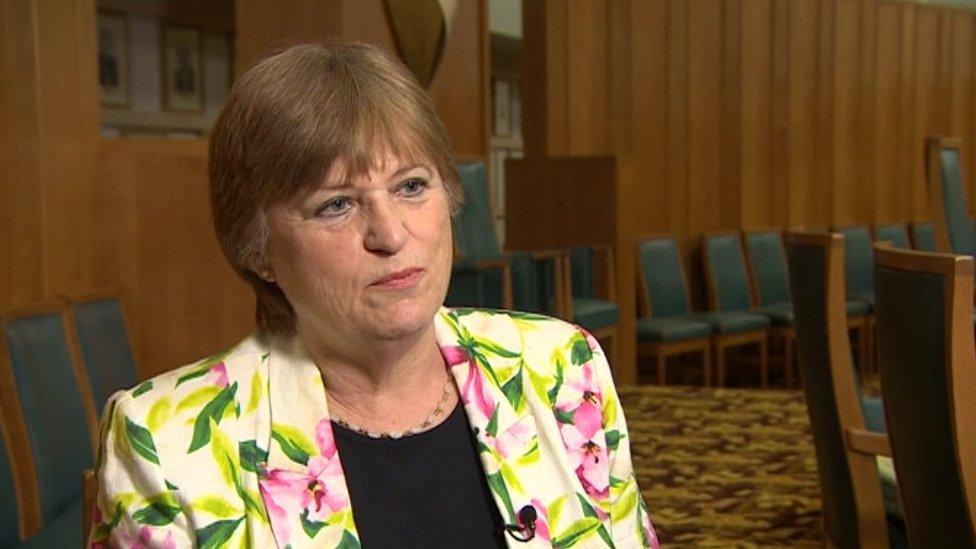Call to boost number of women councillors in the East
- Published

Margaret Dewsbury has been a county councillor in Norfolk since the 1980s
Only 30% of councillors in authorities in the East of England that are having elections on Thursday are women, the BBC has found.
The council with the largest number of female members is Norwich City Council where 43% are women. The figure falls to 17% at Castle Point Borough Council.
The Fawcett Society has called for more action to boost women councillors.
The Women's Local Government Association said figures in the East were similar to the national picture.
According to a recent survey, external, 78% of council employees nationally are women.
However, research by the BBC shows that in the 19 authorities in the East holding elections less than a third of women are currently councillors, and just four councils (21%) have female leaders.

Pioneer: Mabel Clarkson
Mabel Clarkson (1875-1950) was elected a Liberal councillor in Norwich in 1913, external.
She was the first and for many years the only woman serving in the council chamber.
She was appointed as a magistrate in 1922 and became Norwich's second lady mayor in 1930.

Nationally, 33% of councillors and 17% of council leaders, external are female. About 50% of the UK population as a whole are women, external, according to statistics for 2016.
Conservative Margaret Dewsbury, a parish, district and county councillor in Norfolk since the 1980s, chairs the arts forum on Norfolk County Council.
But she is in the minority on the county's authority where only 24% of councillors are women.
"There are far more women than there were. At one time they were [only] expected to be secretaries or treasurers," she said.
'Insufficient childcare'
Julie Brociek-Coulton, who has been a Labour councillor in Norwich for 14 years and is next up for election in 2019, said women had an important part to play.
"Sometimes women can relate to people more than men," she said.

Women councillors in the East (percentage high to low)
Norwich City Council: 39 seats, 17 women = 43%
Stevenage Borough Council: 39 seats, 16 women = 41%
South Cambridgeshire District Council: 41 seats, 16 women = 39%
Brentwood Borough Council: 37 seats, 14 women = 38%
Great Yarmouth Borough Council: 39 seats, 15 women = 38%
North Hertfordshire District Council: 39 seats, 14 women = 36%
Milton Keynes Council: 57 seats, 20 women = 35%
Welwyn Hatfield Borough Council: 48 seats, 17 women = 35%
Colchester Borough Council: 51 seats, 17 women = 33%
Cambridge City Council: 41 seats, 13 women = 32%
Southend-on-Sea Borough Council: 51 seats, 15 women = 29%
Harlow Council: 33 seats, 9 women = 27%
Ipswich Borough Council: 48 seats, 13 women = 27%
Daventry District Council: 36 seats, 9 women = 25%
Peterborough City Council: 60 seats, 14 women = 23%
Rochford District Council: 39 seats, 9 women = 23%
Huntingdonshire District Council: 52 seats, 11 women = 21%
Basildon Council: 42 seats, 8 women = 19%
Castle Point Borough Council: 41 seats, 7 women = 17%
Source: BBC research

Richard Bazeley, policy and insight manager with women's rights campaign group the Fawcett Society, said: "Across the country we are stuck at a third of councillors are women. It hasn't changed significantly for 20 years, while it has changed in the House of Commons [with a big increase in female MPs]."
He said one of the reasons for this was that the structures of councils were "built around assuming there is a male breadwinner, with meetings held at inconvenient times and a lack of maternity policies and insufficient childcare".
There have also been problems with sexual harassment in councils, he said.
He called for more action to boost number of women councillors.
"Political parties and the Local Government Association need to encourage women to stand. We know that party quotas for the number women candidates works and does not lower the quality of candidates," said Mr Bazeley.
Lesley Clarke, chairperson of the Women's Local Government Association, said the figures in the East were similar to the national picture.
"It tends to be male, pale and stale men," she said.
She said she did not support all-women shortlists for candidates, as she feared it did not "get the best person for the job".